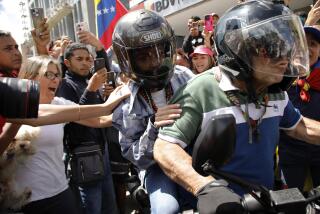Hard Facts in a Factory Town Take Their Toll
- Share via
IVANOVO, Russia — The people of Russia’s dying cotton industry have little to thank President Boris N. Yeltsin for.
Since he began dragging this city toward capitalism five years ago, many of its state-run factories have been forced to close, unemployment is nearly double the post-Soviet average, and its children are taking to the street to sell rival textiles imported from Turkey and Taiwan.
But faced with a direct choice between the incumbent and Communist challenger Gennady A. Zyuganov in the final round of presidential elections Wednesday, the mostly middle-class citizens who bothered to turn up at polling stations during sluggish voting here said grudgingly that they would opt for “the lesser of two evils”--Yeltsin.
“Even though Yeltsin doesn’t impress me much personally, I’m still going to cast my vote for him because I don’t want to go backward with Zyuganov,” said Andrei B. Korzhenevsky, 46, chairman of Polling Station No. 2 and a professor at Ivanovo’s Chemical Academy. “We’ve been there, we’ve done that, and we’ve had enough of the comrades.”
This note of resigned realism is new for Ivanovo, a shabby town set in the fertile, wood-fringed farmland 160 miles northeast of Moscow whose people are still smarting at the loss of their old claim to fame--that their textiles dressed the whole of the vanished Soviet Union.
Since 1991, this onetime cotton capital has seen real hardship.
As its old supplies of cheap raw materials from Central Asia were cut off by the collapse of the Soviet Union, Yeltsin’s government opened up the Russian economy, and Ivanovo lost out to foreign competition.
Unemployment was running at 13% in March, well above the 8% national average. Most of the 60 textile plants, which once employed 70% of the city’s population, are idle.
In the first round of presidential voting June 16, the people of Ivanovo used their ballots to register a strong protest against Yeltsin and the painful mix of reform and bureaucratic corruption they say he represents.
Nearly a third of them turned their backs on both the president and Zyuganov, his main rival, and voted instead for law-and-order candidate Alexander I. Lebed, who promised a crusade against corruption and excessive Western influence without threatening a return to the Communist past.
Nationwide, Lebed came in third out of 10 candidates. Yeltsin quickly signed him up as the Kremlin’s new security chief, hoping that the ex-general’s popularity would rub off on him in time for the second-round runoff against Zyuganov.
The strategy had only mixed results in Ivanovo.
Officials said they had the impression that Lebed voters, mostly the elderly have-nots of post-communism, felt so betrayed by their onetime hero when he threw in his lot with the president that they stayed away from the polls altogether.
Low turnout of about 40% by midafternoon bore out the officials’ supposition.
Only one of 21 people surveyed on the street, 58-year-old driver Nikolai P. Lipeshkin, admitted to having supported the general June 16--but he said he voted against both Yeltsin and Zyuganov this time.
“No one wanted to vote for Yeltsin, who stopped us from working and shut down our factories. We thought Lebed was a man of honor, so we went over to him. Now the traitor has sold us out and joined Yeltsin,” he said in disgust.
Others took a staunchly pro-Yeltsin line, perhaps because of a fear, lingering from Soviet days, of publicly standing out against the majority view. As public belief grew that Yeltsin would win, his onetime opponents began vanishing from sight.
Ivanovo’s dilapidated streets were still festooned Wednesday with pro-Yeltsin advertisements, in violation of electoral rules that said campaigning had to stop Monday.
A media blitz of presidential propaganda over the last two weeks may have made protest voters shy of expressing hostility toward Yeltsin on the street, and perhaps also at the ballot box.
But Valya I. Kirillova, the chic 25-year-old manager of Ivanovo’s new Nike sportswear shop, said the predominance of pro-Yeltsin voters is a sign of better times to come.
The young and the educated, she said, are learning to survive economically outside state factories. Like her, they are now traveling the world and building profitable import-export businesses. They have no time or inclination for Communist nostalgia, she said.
“All these things people say here--about how we’re suffering and living badly in a bad country--are in their heads. It’s perfectly possible to earn good money here. People just need to get started,” she said.
As for Yeltsin, “he’s not perfect, but he’s the best we’ve got at the moment,” she said. “And I still believe that, with him, there’s a shining future for us out there somewhere.”
More to Read
Sign up for Essential California
The most important California stories and recommendations in your inbox every morning.
You may occasionally receive promotional content from the Los Angeles Times.












